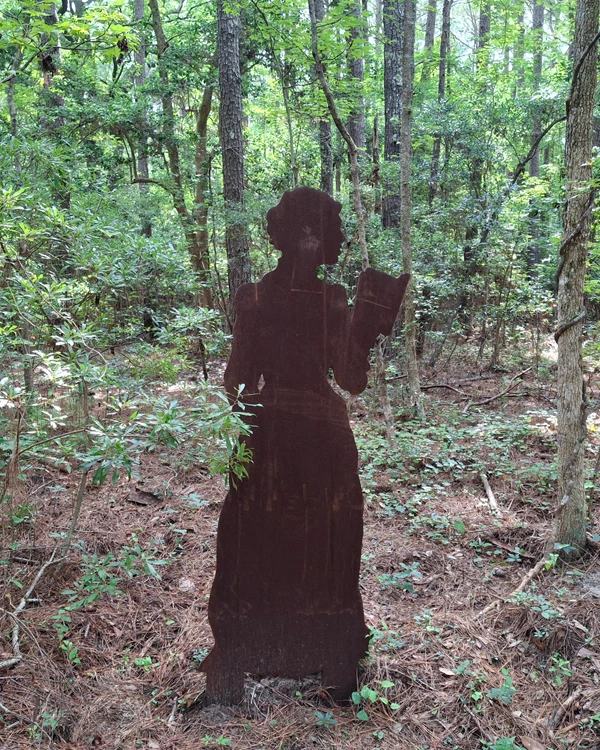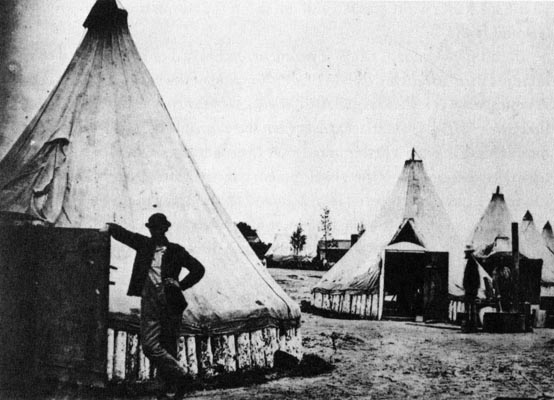Last updated: August 12, 2025
Person
Sarah Freeman

NPS Photo
The development of the Freedmen’s Colony of Roanoke Island was made possible through the dedicated efforts of missionaries who arrived on the island to assist the formerly enslaved people. Notable among these missionaries is Sarah Pearl Freeman, a selfless individual from New England who, together with her daughter Katherine, demonstrated remarkable resilience in the face of seemingly impossible challenges.
Sarah Pearl was born in Connecticut on May 23, 1813, to Joshua and Eunice Pearl. Her brother, Reverend Cyril Pearl, was a preacher who played a key role in establishing the East Orrington Congregational Church in Orrington, Maine in 1834. During the Civil War, he served with the American Missionary Association and shared his sister's deep commitment to aiding formerly enslaved individuals. Sadly, he died of pneumonia on February 19, 1865. In this same town, Sarah married Smith Freeman, a local teacher who had also been instrumental in the founding of the East Orrington Congregational Church. Her two daughters, Henrietta and Katherine “Kate” Freeman, were born in Maine in 1837 and 1847, respectively. However, Henrietta passed away in 1852, and just three years later, Smith Freeman passed away on January 3, 1855.
Following her husband's passing in 1855, Sarah Freeman, a dedicated teacher, relocated to Milford, Massachusetts with her remaining daughter, Katherine. However, her time as a teacher in Massachusetts was short-lived. With the outbreak of the Civil War, Sarah and Katherine were appointed as educators for the National Freedmen’s Relief Association (NFRA) and were sent to North Carolina. They initially provided educational support to the formerly enslaved people in Plymouth, North Carolina, which had been under United States Army control since May 1862. During her time in Plymouth, Mrs. Freeman operated as the superintendent of a school attended by approximately 600 students of various ages.
Due to the expected recapture of Plymouth, the NFRA missionaries who resided there were permanently transferred to the Freedmen’s Colony of Roanoke Island aboard the U.S.S. Massasoit. In April of 1864, the Confederate troops recaptured Plymouth, effectively ending the education opportunities of the formerly enslaved people residing there. Despite the perceived setback of losing all they had built and done at Plymouth, Sarah Freeman and the other missionaries remained committed to their purpose, even as they were directed elsewhere.
Despite being one of the oldest teachers at age 51, Sarah Freeman's remarkable dedication during her time as a teacher at the Freedmen’s Colony of Roanoke Island distinguished her as a resilient and industrious woman. Even when she was stricken with malarial fever and confined to her bed for a period, Freeman persisted in her unwavering efforts, alongside her daughter, to tirelessly distribute food and clothing to the formerly enslaved individuals on the island. This arduous task often consumed their entire day, even still, a considerable number of the island's formerly enslaved people remained without their provisions.
In addition to her labor distributing rations in the colony, Mrs. Freeman played a pivotal role in the establishment of a vocational school designed to impart essential skills to women. Such skills included quilting, straw braiding, sewing, and knitting. Moreover, Mrs. Freeman, in collaboration with Martha Culling, laid the foundation for a school on the island, with lessons being conducted in Sibley tents (examples pictured below) to accommodate the educational needs of 30 students per teacher. Mrs. Freeman also displayed remarkable compassion by personally assuming responsibility for the care of five orphans, including "little Jimmy," who was approximately six years old at the time.

Even after the conclusion of the Civil War in 1865, Sarah chose to remain in the Freedmen’s Colony until 1866, recognizing the necessity of support for many of the inhabitants, particularly the elderly, ill, and orphaned. In addition to her hands-on efforts, Freeman corresponded with the National Freedmen’s Relief Association, and her letters were subsequently featured in the National Freedman, the official journal of the NFRA. These letters provide crucial insights into the daily realities of life in the Freedmen’s Colony on Roanoke Island. They shed light on the challenges faced by both the missionaries and the formerly enslaved individuals living on the island, enriching our understanding of this historical period.
In the post-war period, Sarah and Katherine Freeman moved to Indianapolis, Indiana, from at least 1870 onward. Katherine married Attorney Robert P. Parker, who died in 1879. Sarah Freeman passed away in Indianapolis on May 27, 1893.
In the life of Sarah Freeman, we witness the positive impacts of resilience in pursuing what is morally right, despite the inevitable challenges. Although her story is exceptional, it is just one of many that transpired in the Freedmen’s Colony of Roanoke Island. Relocations and shifts in circumstances can occur for all of us as we pursue our goals and aspirations, but at times, we must simply make the best of the situation we are in.
